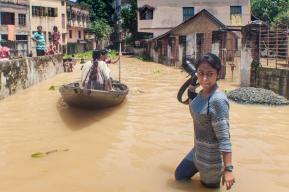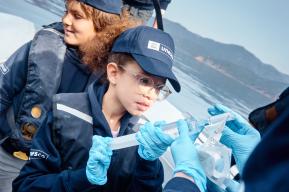观点
非洲:蓝色淘金热

越来越多的非洲国家将蓝色经济视为具有战略意义的经济领域。他们意识到,蓝色经济关系到海洋资源的可持续利用,今后可能成为推动发展的重要力量。但是,唯有加大工作力度,应对气候变化和过度捕捞带来的影响,这条路才行得通。
亚当·阿卜杜·哈桑(Adam Abdou Hassan)
法国鲁昂大学公法教授兼研究员、尼日尔战略和国际研究所执行主任
非洲联盟盛赞蓝色经济是“实现非洲复兴的新疆域”。这个泛非组织在《2063年议程》中确定了未来几十年的战略发展方向,其中特别将蓝色/海洋经济确定为目标和优先领域之一。2016年3月,联合国非洲经济委员会发布非洲大陆蓝色经济政策手册,也表明了对于这一领域的关注。
蓝色经济是一个相对较新的概念,但它可以成为推动非洲大陆发展的强力手段。塞舌尔等国已经为此采取措施,将海洋利用纳入国家发展计划。2014年,南非启动“Phakisa行动”(塞索托语,意为“加快”),希望通过海上运输和制造、海上油气勘探和水产养殖,可持续地开发海洋经济潜力。西非,多哥和塞内加尔等国也已制定战略,发展可持续蓝色经济。
非洲大陆共有54个国家,其中包括38个沿海国家和岛屿国家,领水面积达1300万平方千米,而且非洲90%以上的进出口都要经过海运。发展海洋经济大有可为。
蓝色经济可以成为推动非洲大陆发展的强力手段
重要的蛋白质来源
海洋资源可以提供重要的海鱼和淡水鱼,有助于解决近2亿非洲人的营养和粮食安全问题。在粮食短缺的低收入国家,民众摄取的动物蛋白质有将近20%来自鱼类。在人口密集的岛屿和沿海国家,例如加纳、几内亚和塞内加尔,这一比例上升到50%。由此可见,发展海洋经济事关重大,特别是在非洲人口预计到2050年翻一番的情况下,届时,非洲人口数量将从12亿增加到25亿。
海洋资源有助于解决近2亿非洲人的粮食安全问题
非洲水产养殖和渔业部门雇用了约1230万人,但这一部门在很大程度上尚未得到充分开发。这个行业需要进一步提高专业化程度,以便创造更多工作岗位。此外,还需要鼓励开发其他相关工作岗位,例如开设专门工厂,负责鱼类加工、处理和转化,在当地或次区域发展制造业和渔网编织业。开发这些工作可以帮助青年和妇女等弱势群体融入社会。在西非,将近80%的海产品都由这些弱势群体负责销售。但这些人得到的报酬偏低,他们为经济、就业和粮食安全作出的贡献也被低估了。
蓝色经济可以为非洲国家创造机会, 在工业化进程中实现飞跃。要做到这一点,可以省略一些步骤,同时将气候变化和可持续发展措施纳入其中。生物技术对于生物、医药和粮食部门的产品制造尤为关键,同时为传统的化石燃料提供了替代方案。例如,摩洛哥就把握住了开发海藻带来的经济机会,该国的BIOXPARC技术园区网络是马拉喀什的生物技术中心。突尼斯的BIOVecQ跨界实验室则是水产品可持续加工的另一个范例。
螺旋藻和鱼饼干
创新和研究可以刺激蓝色经济可持续发展,在涉及海洋增值服务的新领域就更是如此了。这些举措正在迅速遍及整个非洲大陆。位于贝宁波多诺伏的Songhaï中心开发出一种蓝色经济模式,将能源、植物生产与水产养殖结合起来。在这一模式中,可以利用废水生产沼气,为家庭提供能源。堆肥残渣经过矿化过程,可用于滋养浮游植物、浮游动物和底栖生物,这些生物又可以成为养鱼场的饲料。
另一个创新实例是喀麦隆杜阿拉大学设在亚巴西的渔业和水产科学研究所。这里设立了生产和加工螺旋藻的试点部门,利用螺旋藻制造肥皂、酸奶和饮料。在肯尼亚,AquaEdge Africa公司正在努力用鱼肉制造高蛋白饼干。
然而,要充分发挥蓝色经济的潜力,需要各国消除气候变化和环境管理失误造成的不利影响。人为造成的气候变化对非洲的影响尤其恶劣。但这还不是唯一的难题,一些渔场的过度开发格外令人担忧。
西非是全球渔业资源最丰富的地区,同时也是受过度捕捞影响最严重的地区。联合国贸易和发展会议(贸发会议)《2016年渔业贸易审查报告》指出,西非沿海有一半的渔业资源遭到过度捕捞,其中部分原因是非法捕捞。
全球独立智库——海外开发研究所(ODI)估算,从塞内加尔到尼日利亚的沿海地区,50%以上的鱼类资源遭遇了过度开发。据估计,非法捕捞所得占区域渔获总量的三分之一到一半。
要克服这些障碍,需要该区域各国团结协作。2016年通过的非洲联盟《洛美宪章》旨在应对“非法开发和掠夺海洋资源”的行为。《宪章》禁止交易通过非法开发手段获得的产品,这种开发还危及非洲大陆的粮食安全。因此,非洲国家必须针对这些挑战制定应对措施,让非洲人民能够充分享受海洋的馈赠。
拓展阅读:
《治病的海草》,联合国教科文组织《信使》,2011年1-3月。
《渔民以火把对抗船队》,联合国教科文组织《信使》,2000年9月。
《水产养殖:拥有四千年历史的增长型产业》,联合国教科文组织《信使》,1995年11月。
订阅联合国教科文组织《信使》,阅读发人深省的时事文章,数字版免费。
在社交网络上关注联合国教科文组织《信使》:微博、微信公众号“联合国教科文信使”、Twitter、Facebook、Instagram。
By Adam Abdou Hassan
The African Union has hailed the blue economy as a “new frontier of the African renaissance”. In its Agenda 2063, which sets the strategic directions for future decades, the pan-African organization identifies the blue/ocean economy as one of its goals and priority areas. The publication of a policy handbook in March 2016 on the continent’s blue economy by the United Nations Economic Commission for Africa is another indicator of the interest in this sector.
Although it is still a relatively new concept, the blue economy could be a powerful tool for the development of the African continent. Some countries, such as the Seychelles, have already taken steps towards it, by integrating the harnessing of the ocean into their development plans. In 2014, South Africa launched Operation Phakisa (“hurry up” in Sesotho), to sustainably exploit the economic potential of the ocean through maritime transport and manufacturing, offshore oil and gas exploration, and aquaculture. In West Africa, countries including Togo and Senegal have adopted strategies to build a sustainable blue economy.
The prospects are promising for a continent which includes thirty-eight coastal and island countries, with territorial waters covering 13 million square kilometres, out of a total of fifty-four states. In addition, over ninety per cent of African imports and exports are carried out by sea.
The blue economy could be a powerful development tool for the African continent
A vital source of protein
Marine resources could help address the nutritional and food security issues of nearly 200 million Africans, through the vital contribution of marine and freshwater fish. In food-deficient and low-income countries, fish provides almost twenty per cent of animal proteins consumed by their populations. This number rises to fifty per cent in densely- populated island and coastal countries such as Ghana, Guinea, and Senegal. The stakes are therefore high, especially because Africa’s population is set to double by 2050 – from 1.2 billion to 2.5 billion inhabitants.
Marine resources could help to address the food security issues of nearly 200 million Africans
The aquaculture and fisheries sector – which employs about 12.3 million people in Africa – is still largely under-exploited.The industry needs to be professionalized further to create more jobs. The development of related jobs – such as the processing, treatment and transformation of fish by setting up specific modules, and the local or sub-regional manufacture and weaving of nets, etc. – also needs to be encouraged. The development of these jobs could enable the social integration of vulnerable populations, such as youth and women. In West Africa, these groups are already responsible for selling nearly eighty per cent of all seafood products. However, the tasks they perform are under-paid and their contributions to the economy, to employment, and to food security are underestimated.
The blue economy could provide the opportunity for African states to take a leap forward in the industrialization process. This could be done by skipping some steps, while integrating climate change and sustainability measures. Biotechnology, in particular, makes it possible to manufacture products in the biological, pharmaceutical and food sectors, and offers an alternative to the use of traditional fossil fuels. Morocco, for example, has seized the economic opportunity to exploit marine algae. Its BIOXPARC network of technology parks is a biotechnology hub in Marrakesh. The trans-border laboratory BIOVecQ in Tunisia is yet another example of the sustainable processing of aquatic products.
Spirulina and fish biscuits
Innovation and research, especially in new sectors related to the added value of services from the sea, can stimulate sustainable blue growth. These initiatives are already multiplying across the continent. The Songhaï Centre in Porto-Novo, Benin, has developed a blue economy model that combines energy and plant production with aquaculture. It produces methane from wastewater to provide energy for domestic use. Following a mineralization process, the compost remains can be used to feed phytoplankton, zooplankton, and benthos – which in turn are used to feed fish in a fish farm.
Another example that showcases innovation is the Institute of Fisheries and Aquatic Science, Yabassi, at the University of Douala in Cameroon. It has set up a pilot unit for the production and processing of spirulina, used for the manufacture of soaps, yoghurts, and drinks. In Kenya, AquaEdge Africa is working to transform fish into high-protein biscuits.
However, to fully exploit the potential of the blue economy, countries need to address the adverse impacts of climate change and environmental mismanagement. Africa is vulnerable to the negative effects of human-induced climate change. This is not the only challenge, though. The over-exploitation of some fishing grounds is of major concern.
One of the world’s richest fishing regions, West Africa is also one of the most affected by overfishing. According to a 2016 review on the Fish Trade by the United Nations Conference on Trade and Development (UNCTAD), half of the fish stocks off West Africa’s coast are considered overfished. This is partly due to illegal fishing.
The Overseas Development Institute (ODI), an independent global think-tank, estimates that over fifty per cent of the fish resources of the coastal zone from Senegal to Nigeria have already been over-exploited. It is estimated that illegal fishing accounts for between a third and a half of the total regional catches.
Overcoming these obstacles will require a concerted effort by countries in the region. Adopted in 2016, the African Union’s Lomé Charter is a response to the “illegal exploitation and plundering of marine resources.” It prohibits trade in products derived from such exploitation, which also jeopardizes the food security of the continent. It is therefore essential that African States develop responses to these challenges, so that their populations can fully benefit from this bounty from the ocean.
Adam Abdou Hassan
Professor and researcher in public law at the University of Rouen Normandie, France, and Executive Director of the Niger Institute of Strategic and International Studies.







